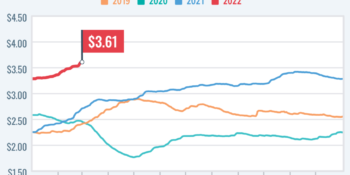larksdale, Miss., April 20, 2022 – U.S. Department of Agriculture (USDA) Secretary Tom Vilsack and White House Domestic Policy Advisor Susan Rice today announced a new whole-of-government effort led by USDA to transform the way federal agencies partner with rural places to create economic opportunity in rural America. The USDA-led
Rural Partners Network (RPN) is an all-of-government program that will help rural communities access government resources and funding to create jobs, build infrastructure and support long-term economic stability.
Today’s announcement is part of the Biden-Harris Administration’s
Building a Better America Rural Infrastructure Tour, during which Biden Administration officials are traveling to dozens of rural communities to talk about the impact of Bipartisan Infrastructure Law investments, as well as President Biden’s broader commitment to ensure federal resources reach all communities in rural America. Secretary Vilsack and Ambassador Rice are in Mississippi with Congressman Bennie Thompson (MS-2) to meet with community leaders and stakeholders who will benefit from RPN in Clarksdale and Greenwood, Mississippi.
“Under the leadership of President Biden and Vice President Harris, USDA and its federal partners are committed to unlocking the full potential of rural America by investing in its people and the unique visions they have for the places they call home,” Vilsack said. “Rural America is incredibly diverse – economically, racially, culturally and geographically. What makes sense for one community may not for another. The Rural Partners Network will help communities get funding for investments that create long-lasting benefits for their communities, especially those that have been overlooked in the past. By providing one-on-one support to these communities, we can lay the foundation for people to build healthy, successful futures on their own terms.”
Vilsack added, “We are also grateful for our Congressional partners like Congressman Bennie Thompson, Senator Cortez Masto and Senator Kelly who work tirelessly to ensure that all communities have access to federal funding, and that we are coordinating these resources across the federal government.”
“President Biden has delivered unprecedented resources for rural communities through the American Rescue Plan and the Bipartisan Infrastructure Law,” Rice said. “However, just making resources available is not enough—the federal government must work better for rural communities so that they can fully take advantage of these opportunities. The Rural Partners Network will empower rural communities to get their fair share of federal funds, an important goal for not only economic development but equity as well.”
Background: Rural Partners Network
The Rural Partners Network is a first-of-its-kind collaboration between federal agencies and local leaders and residents. This Network is focused on improving social and economic well-being bolstered by existing local partnerships and assets. The Network will launch in selected communities in Georgia, Kentucky, Mississippi, New Mexico as well as certain Tribes within Arizona. Community networks within these states will receive individualized support with the expertise to navigate federal programs, build relationships and identify additional resources to promote community-driven solutions.
USDA has selected the following community networks for the Rural Partners Network:
- In Georgia: Emanuel County and City of Twin City Community Network; Ben Hill County and City of Fitzgerald Community Network; and Southwest Georgia Regional Commission Community Network including the counties of Baker, Calhoun, Colquitt, Decatur, Dougherty, Early, Grady, Lee, Seminole, Miller, Mitchell, Terrell, Thomas and Worth.
- In Kentucky: Kentucky Highlands Community Network including the counties of Bell, Clay, Harlan, Knox, Leslie, Letcher, Perry and Whitley; and Fulton County and cities of Fulton, Hickman and Cayce Community Network.
- In Mississippi: Washington County Economic Alliance Community Network including the counties of Bolivar, Leflore, Sunflower and Washington; Greater Grenada, Lake District Partnership Community Network including the counties of Grenada and Yalobusha; and North Delta Planning and Development District Community Network including the counties of Coahoma, Quitman and Tunica.
- In New Mexico: Southwest New Mexico Council of Government Community Network including the counties of Catron, Grant, Hidalgo, and Luna; Northern New Mexico Pathways Economic Development District Community Network including the counties of Mora, San Miguel, Colfax and Taos; and Mesilla Valley Community Network including the county of Doña Ana.
- In Arizona: San Carlos Apache Tribe, Tohono O’odham Nation and Cocopah Indian Tribe.
Each community network will be supported by a Rural Partners Network team to help address that community’s specific needs and concerns, building on local assets. Network staff will also be responsible for sharing lessons learned from selected communities with federal agencies in D.C. to ensure rural communities have a voice in policymaking. Policy development will occur through regular convenings of the Rural Prosperity Interagency Policy Council, co-led by USDA and the Domestic Policy Council. There are 16 federal agencies and regional commissions participating in the Council. Members of Congress across the political spectrum have called for this whole-of-government approach, including U.S. Senators Catherine Cortez Masto, Joni Ernst, Kirsten Gillibrand, Chuck Grassley, and Mark Kelly, and U.S. Representatives Angie Craig, Dan Newhouse, Cindy Axne, Adrian Smith, Tom O’Halleran, and Randy Feenstra. To deliver on the promise to make federal resources more readily available to underserved communities across rural America, the Biden-Harris Administration will expand the Rural Partners Network to additional places later in fiscal year 2022. Those states, Tribes and territories include Nevada, North Carolina, Puerto Rico, West Virginia, Wisconsin, and Native Alaskan communities.
Information about the Rural Partners Network is available online at
Rural.gov.
Background: Building a Better America Rural Infrastructure Tour
Under the leadership of the Biden-Harris Administration, USDA and its federal partners in the
Infrastructure Implementation Task Force are working with rural communities to deliver on the promise of support for rural America.
The Building a Better America Rural Infrastructure Tour is a multi-faceted outreach effort involving cabinet and sub-cabinet officials across federal agencies as they travel to and learn from key rural communities. These visits will highlight new federal funding and investments already underway through the Bipartisan Infrastructure Law, a once-in-a-generation investment that will support rural communities and their infrastructure needs.
USDA touches the lives of all Americans each day in so many positive ways. In the Biden-Harris Administration, USDA is transforming America’s food system with a greater focus on more resilient local and regional food production, fairer markets for all producers, ensuring access to safe, healthy and nutritious food in all communities, building new markets and streams of income for farmers and producers using climate-smart food and forestry practices, making historic investments in infrastructure and clean-energy capabilities in rural America, and committing to equity across the Department by removing systemic barriers and building a workforce more representative of America. To learn more, visit
www.usda.gov.
Under the Biden-Harris Administration, Rural Development provides loans and grants to help expand economic opportunities, create jobs and improve the quality of life for millions of Americans in rural areas. This assistance supports infrastructure improvements; business development; housing; community facilities such as schools, public safety and health care; and high-speed internet access in rural, tribal and high-poverty areas. For more information, visit
www.rd.usda.gov.




